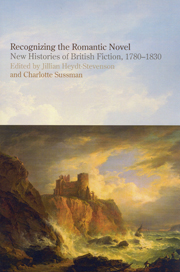Book contents
- Frontmatter
- Contents
- Acknowledgements
- Notes on Contributors
- Preface
- 1 ‘Launched Upon the Sea of Moral and Political Inquiry’: The Ethical Experiments of the Romantic Novel
- 2 Bad Marriages, Bad Novels: The ‘Philosophical Romance’
- 3 Enlightenment or Illumination: The Spectre of Conspiracy in Gothic Fictions of the 1790s
- 4 Burney's Conservatism: Masculine Value and ‘the Ingenuous Cecilia’
- 5 ‘All Agog to Find Her Out’: Compulsory Narration in The Wanderer
- 6 A Select Collection: Barbauld, Scott, and the Rise of the (Reprinted) Novel
- 7 Austen, Empire and Moral Virtue
- 8 Fanny Price's British Museum: Empire, Genre, and Memory in Mansfield Park
- 9 Between the Lines: Poetry, Persuasion, and the Feelings of the Past
- 10 Scholarly Revivals: Gothic Fiction, Secret History, and Hogg's Private Memoirs and Confessions of a Justified Sinner
- 11 Sympathy, Physiognomy, and Scottish Romantic Fiction
- Works Cited
- Index
7 - Austen, Empire and Moral Virtue
- Frontmatter
- Contents
- Acknowledgements
- Notes on Contributors
- Preface
- 1 ‘Launched Upon the Sea of Moral and Political Inquiry’: The Ethical Experiments of the Romantic Novel
- 2 Bad Marriages, Bad Novels: The ‘Philosophical Romance’
- 3 Enlightenment or Illumination: The Spectre of Conspiracy in Gothic Fictions of the 1790s
- 4 Burney's Conservatism: Masculine Value and ‘the Ingenuous Cecilia’
- 5 ‘All Agog to Find Her Out’: Compulsory Narration in The Wanderer
- 6 A Select Collection: Barbauld, Scott, and the Rise of the (Reprinted) Novel
- 7 Austen, Empire and Moral Virtue
- 8 Fanny Price's British Museum: Empire, Genre, and Memory in Mansfield Park
- 9 Between the Lines: Poetry, Persuasion, and the Feelings of the Past
- 10 Scholarly Revivals: Gothic Fiction, Secret History, and Hogg's Private Memoirs and Confessions of a Justified Sinner
- 11 Sympathy, Physiognomy, and Scottish Romantic Fiction
- Works Cited
- Index
Summary
Much of the recent scholarship on Jane Austen has been gripped by a controversy concerning the relationship between Austen and imperialism, especially in Mansfield Park. As the essay by Miranda Burgess in this volume also attests, some critics have worked to retrieve and elaborate the subtle cues that link the quiet, settled order of Austen's domestic setting with the drama of imperial conquest, while others have read the novel as a critique of British imperialism, and Austen herself as a sister and friend to the wretched of the earth. What I want to propose in this essay is that Mansfield Park's engagement with the cultural politics of imperialism is at once less straightforward and more profound than has been suggested so far, but that that engagement can only be elaborated in relation to the novel's treatment of questions seemingly far removed from the blood and sweat of imperial conquest, to which they are, however, inexorably tied. For in Mansfield Park, we can see Austen articulating – precisely in connection with Britain's changing national and imperial project – some of the key cultural and political concerns underlying the emergent culture of modernization; above all, the vital new role of moral virtue as the key to the self-regulating subject who would form the core of modern culture, and the new role for women as the ideological guarantors of that moral virtue.
- Type
- Chapter
- Information
- Recognizing the Romantic NovelNew Histories of British Fiction, 1780-1830, pp. 192 - 207Publisher: Liverpool University PressPrint publication year: 2010



